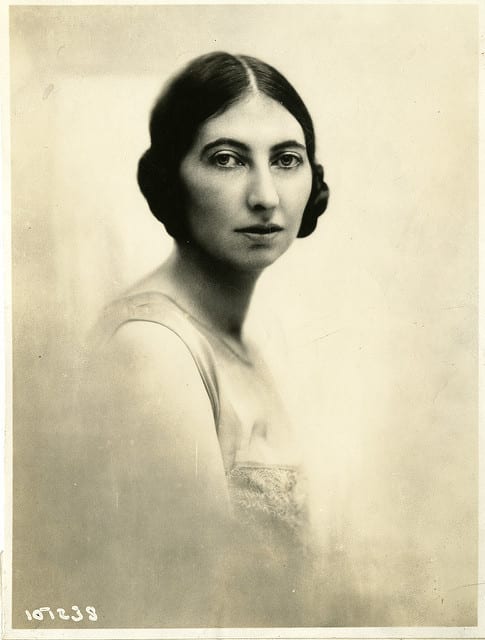Portraying a Deaf female character – “Not in the Calendar” by Margaret Kennedy
By H Dominic W Stiles, on 24 March 2017
Margaret Kennedy (1896-1967) is today best remembered for her 1924 novel, The Constant Nymph. Her daughter, Julia Birley, was a novelist, as is her granddaughter, Serena Mackesy. You can read more about her on Wikipedia and in the Dictionary of National Biography.
In 1964 she published what was to be her final novel, Not in the Calendar. It seems to be the only one of her novels not to have been reprinted, but it is nevertheless of interest as it centres around the relationship between a Deaf girl call Winsome, later re-named as Wyn, who is the daughter of a kennel man, and one of the daughters of her her father’s wealthy employers, Carrie Knevett. As far as I could see (without doing major research) Margaret Kennedy did not have any particular connection with deaf people, but if you know otherwise please comment. In a note at the beginning of the book, she tells us that
I could not have ventured to write this book without the advice and criticism of Miss Edith Whetnall and of Dr Pierre Gorman, Librarian to the Royal National Institute for the Deaf. I wish to thank them for their great kindness and for the trouble which they took to help me.
 Image Smithsonian Institution @ Flickr Commons
Image Smithsonian Institution @ Flickr Commons
Deborah Kent says,
Not in the Calendar is one of those utterly remarkable novels that, for some unaccountable reason, are overlooked and forgotten by critics and the reading public alike. Published in 1964, just before the women’s movement gained momentum, it is in its quiet way a rallying cry for feminism. Among the women in Kennedy’s gallery of minor characters are childish, pampered Lallie; Ida the maid, with dreams of rising to a higher station in life; and Daphne, with her unsettling habit of slipping long confessional letters beneath the doors of houseguests. All of them are drawn with affection and understanding, and none relies upon men in her quest for fulfillment. (Kent, p.103)
[…]
In the novels and plays I have examined, Wyn Harper is one of the few disabled women whose life combines professional achievements and the satisfaction of deep and enduring friendship. Furthermore, she is almost alone in her resolution of the conflict between self-acceptance and assimilation into the world of non-disabled people-a conflict few writers even acknowledge. (ibid p.105)
In his 1987 article, Douglas Biklen says,
Kennedy’s Not in the Calendar (1964) reveals the constant negotiations over identity required of people with disabilities and of their allies. Can Win achieve the status of artist, with her deafness relegated to being a single quality and not an all-defining characteristic? Can Carrie educate deaf children without being a lady bountiful? Which social definition of disability will social policy adopt: pity, charity and dependence or independence and self determination? Or, […] in the modern professionalized service oriented society, is the dominant social policy choice between medicalized dependence and self determination? (Biklen, p.531)
I cannot say this is the sort of novel that would excite me, but it may well be of interest to anyone studying Deaf people in literature, and is perhaps worthy of further examination.
Biklen, Douglas , The culture of policy disability images and their analogues in public policy.
Biklen, D., Schooling Without Labels. Philadelphia: Temple University Press, 1992. https://muse.jhu.edu/book/9514
Heshusius, Lous, The Arts, Science, and the Study of Exceptionality. Exceptional Children, Vol. 55, No. I, p. 60-65 http://journals.sagepub.com/doi/pdf/10.1177/001440298805500107
Kent, Deborah, In Search of a Heroine: Images of Women with Disabilities in Fiction and Drama. In Fine, M. A. A.. Women with Disabilities. Philadelphia: Temple University Press, 1989.
McQuilland, Louis J., The creator of “The Constant Nymph.” The Bookman, (Oct 1925): p. 4-6
Powell, Violet, ‘Kennedy, Margaret [married name Margaret Davies, Lady Davies] (1896–1967)’, Oxford Dictionary of National Biography, Oxford University Press, 2004 [http://www.oxforddnb.com/view/article/34281, accessed 24 March 2017]
Richardson, Joanna, The Constant Novelist A Study of Margaret Kennedy (1896-1967) Violet Powell (Book Review). The Spectator, London ![]() 251.8086
251.8086![]() (Jul 2, 1983): 25
(Jul 2, 1983): 25
 Close
Close

